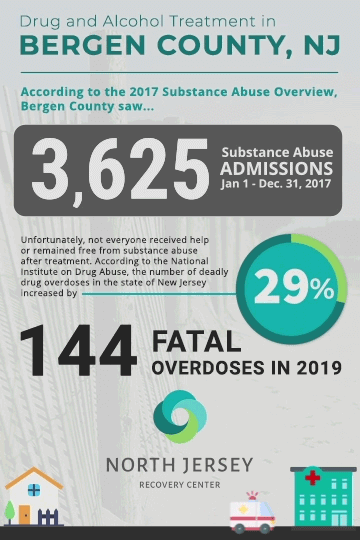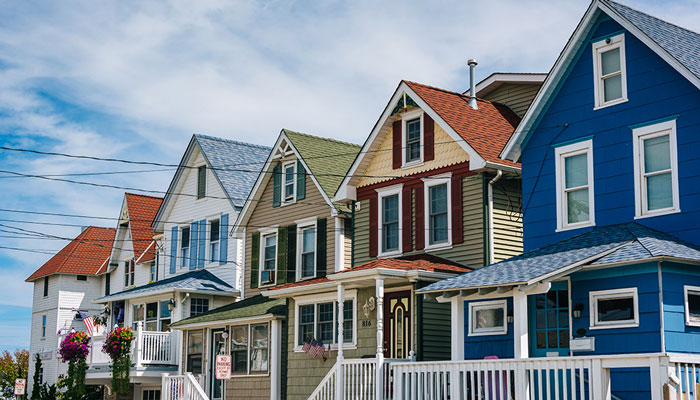Common Locations
We Service
Everyone faces challenges at some point in life. Each individual encounters difficulties and obstacles that prevent them from being the best they can possibly be. Sometimes, physical illnesses take over. Other times, mental health problems develop. One major type of mental health disorder that has proven to be life-changing for many people is substance use disorder, also known as addiction.
Unfortunately, addiction is no stranger to most areas of the United States. North Jersey is no exception to this truth. Many individuals have found themselves suffering from the effects of drug and alcohol abuse here in this state. But, thankfully, those who are struggling with substance use disorder (SUD) can find comfort in the fact that they are not alone in their battle with addiction. They can also find hope in knowing that the state of New Jersey has much to offer when it comes to addiction rehab and recovery resources.
Finding the Resources You Need
It can be difficult for people to break free from substance use disorder. Addiction has a way of affecting every area and aspect of a person’s life. It ruins interpersonal relationships, tears families apart, and even brings about physical health issues. Individuals who suffer from SUD often experience a sense of isolation that simply can’t be compared with any other type of loneliness.
But, there is hope for those who are dealing with the effects of addiction. Here in Bergen County, NJ, people who are struggling with drug or alcohol abuse can get the help they need through the various resources the area has to offer.
People who live in or near Bergen County can get the support and guidance they need using the following resources:
- Outpatient treatment services
- Residential treatment services
- Halfway house services
- Detoxification (Detox) services
- Intensive outpatient program (IOP) services
It’s important to know that you are not alone in your struggle. Many other people around you and throughout the rest of the country are dealing with the same issues. The good news is, though, that there is help available.
Bergen County, NJ Drug Abuse Statistics – You’re Not Alone
New Jersey’s Office of Planning, Research, Evaluation, and Prevention’s study on substance abuse in the area provides fairly recent statistics on this issue. It might surprise you that small New Jersey cities like Paramus, Hackensack or Teaneck has issues with addiction, but it’s true. According to the 2017 Substance Abuse Overview, Bergen County saw 3,625 substance abuse admissions between January 1, 2017 and December 31, 2017. Of these admissions, alcohol abuse was responsible for 1,252. Cocaine abuse accounted for 205 admissions. 1,303 admissions were due to heroin abuse. Marijuana accounted for 514 of the admissions.
The 2018 Substance Abuse Overview on Bergen County reports that there were 1,749 substance abuse treatment admissions between January 1, 2018 and December 31, 2018. According to this report, Hackensack City saw the most admissions (370). Of the admissions in this borough, 121 were due to alcohol abuse and 132 were due to heroin abuse. The next largest number of admissions was found in Garfield City. Of the 252 admissions, alcohol accounted for 90 and heroin was responsible for 82.
The third-largest number of admissions was in Lodi Borough. With 215 substance abuse admissions, the borough was greatly impacted by SUD. There were 68 admissions for alcohol abuse and 70 for heroin abuse. This borough also saw the most admissions amongst individuals aged 18 or below. A total of 18 of the 215 substance abuse admissions were either 18 years old or younger.
Unfortunately, not everyone received help or remained free from substance abuse after treatment. According to the National Institute on Drug Abuse, the number of deadly drug overdoses in the state of New Jersey increased by 29.3% between 2016 and 2017.

NJ Health suspects that Bergen County saw:
- 11 fatal overdoses in January 2019
- 13 fatal overdoses in February 2019
- 8 fatal overdoses in March 2019
- 8 fatal overdoses in April 2019
- 8 fatal overdoses in May 2019
- 17 fatal overdoses in June 2019
- 15 fatal overdoses in July 2019
- 20 fatal overdoses in August 2019
- 7 fatal overdoses in September 2019
- 21 fatal overdoses in October 2019
- 16 fatal overdoses in November 2019
Bergen County, NJ Recovery Meetings Near Me (AA and NA)
Some of the Alcoholics Anonymous (AA) meetings throughout Bergen County, NJ include the following:
- Hackensack Every Answer Found Group
Bergen County Housing, Health and Human Services Center
120 South River Street
Hackensack, NJ 07601
- Lodi No Pews Required
Faith Reformed Church
95 Washington Street
Lodi, NJ 07644
- Bergenfield Central Group
Clinton Avenue Reformed Church
58 James Street
Bergenfield, NJ 07621
Some of the Narcotics Anonymous (NA) meetings throughout Bergen County, NJ include the following:
- Steppin’ It Up
Transition Professionals Bldg.
269 Passaic St
Hackensack, NJ 07601
- Ridgewood Recovery
Ridgewood Reformed Church
271 Lincoln Ave
Ridgewood, NJ 07450
- Slice of Life
Paramus Bible Church
242 Midland Ave
Paramus, NJ 07652
Inpatient Vs. Outpatient Drug and Alcohol Treatment
There are 2 main types of treatment or rehab programs for addiction. Many times, people who are seeking treatment for substance use disorder have to decide what kind of program they should go through. It can be difficult to determine the right type of program, especially for those who are unsure of what their specific needs are. So, if you’re looking for a good rehab track that will address your requirements, it may be helpful to find out more about the 2 main categories of treatment.
Inpatient rehab is also known as residential treatment. This is the type of treatment many people associate with addiction rehab. When individuals enroll in a residential addiction treatment program, they live at their rehab center for the duration of their treatment. In other words, inpatient treatment requires people to live at a treatment facilities instead of at home. Although many people feel uncomfortable about this, residential programs offer a lot of benefits.
For one, people who are in an inpatient rehab program are in a much safer environment. They are in a facilities that doesn’t have drugs or alcohol available. So, the probability of relapse is much lower. Also, individuals have constant access to professional and medical help throughout the recovery process.
Outpatient treatment is the other main type of treatment. Individuals in this type of program may either live at home or in a sober living facilities. Although individuals are not at treatment all day long, they are still able to spend a certain amount of hours in treatment weekly.
It’s important to seek professional advice when working to find the right program for you. You can speak to the team at the treatment center you’re considering in order to decide. Once you find the best facilities, you can begin your recovery journey!
Other Types of Care Programs for Addiction
Many individuals go through intensive outpatient programs (IOPs) for addiction. This kind of program is best for:
- People who are able to continue living at home or working while going through treatment
- People who are transitioning from a more intensive program (inpatient or residential treatment)
IOPs work to help equip and prepare people for life outside of treatment. Often, it includes various types of therapy. It introduces strategies and methods that can help people to become more comfortable in their daily lives after treatment. Individuals may learn more about how to find work or get back in school after rehab. They may also learn more about establishing and maintaining healthy interpersonal relationships.
Other life skills might also be part of the program. For example, individuals may gain more social skills, learn how to budget, and so forth.
Partial-Care is another approach to addiction treatment. Individuals in a Partial-Care Program can engage in a safe, healthy environment where they can navigate through the early stages of recovery from substance abuse. This type of program is characterized by individualized treatment. It works to meet the specific needs of those in recovery.
Getting Help in Bergen County, NJ: How to Choose the Right Facility
If you’re looking for a rehab center near or in Bergen County, NJ, it’s best to establish what to look for in a facilities. Firstly, it’s important to know more about your personal needs and how they should be addressed. For instance, if you have co-occurring disorders, you have what professionals call a “dual diagnosis”. Be sure that the facilities you choose provides a dual diagnosis program in order to best meet your needs throughout recovery.
Would an inpatient program be best for you? Or, is outpatient treatment the perfect fit? It’s important to consider these questions when looking for a treatment center.
Another thing you may need to consider while looking for a treatment center is the location. Is the facilities near your home or far away? Would it be a problem if it’s far from where you live? Are you willing to relocate in order to get the help you need? Be sure to discuss these possibilities with professionals who understand.
Mental Health Services
Often, individuals who suffer from substance abuse also struggle with the effects of co-occurring mental health disorders. This can make fighting addiction all the more difficult for many people. This is due to the fact that mental illness and addiction often interact and even worsen one another’s effects.
In some cases, mental illness causes the development of substance abuse. For instance, a person may use medication to treat depression. Eventually, he or she may grow dependent on this medication. As a result, the individual may begin to misuse the drug and develop an addiction to it.
On the other hand, some addictions cause mental health disorders to develop. For example, a person may suffer from anxiety or depression as a result of excessive alcohol use.
Some of the mental health disorders that often co-occur with addiction include the following:
- Anxiety disorders
- Personality disorder
- Bipolar disorder
- Stress disorder
- Major depressive disorder
- Attention deficit hyperactivity disorder (ADHD)
- Post-traumatic stress disorder (PTSD) or other types of trauma
It can be both challenging and frustrating to deal with the impact of mental health disorders. But thankfully, many mental health resources are available to those in Bergen County.
Get the Help You Need Today
There’s no time like the present to seek help for substance use disorder. If you’re ready to take a step toward recovery, please reach out to us here at North Jersey Recovery Center. Allow our team to work with you as you move toward a healthier, addiction-free version of yourself!
References:
- https://www.co.bergen.nj.us/health-services-addiction-services
- https://www.nj.gov/humanservices/dmhas/publications/statistical/Substance%20Abuse%20Overview/2017/statewide.pdf
- https://www.drugabuse.gov/opioid-summaries-by-state/new-jersey-opioid-summary
- https://nj.gov/humanservices/dmhas/publications/statistical/Substance%20Abuse%20Overview/2018/Ber.pdf
- https://www.njcares.gov/pdfs/2019-NJ-Suspected-Overdose-Deaths-11.30.19.pdf
- https://nnjaa.org/intergroup/cgi-bin/list_nearby_zipcode.php?origin=07401&distance=25&sortby=Day&url=




